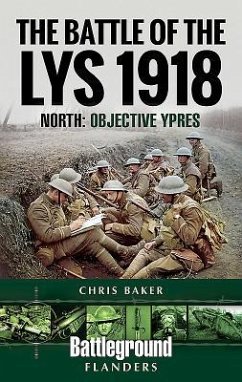The second of two Battelground Europe titles covering this highly significant battle of spring 1918. The German offensive in Flanders in April 1918 came close to catastrophe for the British Armies, but ultimately ended in strategic defeat for the Kaiser's men. Following close on the heels of the devastating 'Operation Michael' attack in March, which had been aimed against the British front on the Somme and Arras, this offensive, 'Operation Georgette', was aimed at strangling the vital railways and roads that supplied the British at Ypres and threatening the vital logistics links with the Channel Ports. Having assembled an overwhelming numerical advantage, the Germans attacked in thick fog on 9 April 1918. By day's end, the Germans had succeeded in gaining a crossing of the River Lys and were well on their way to the railway junctions at Hazebrouck. Next day, they extended the attacked front northwards and advanced to the very gates of Ypres, forcing a British retirement from the bloodily won advances during the Third Battle of Ypres. Messines Ridge, captured so spectacularly by the British in June 1917, was soon in German hands and fighting inched towards Mont Kemmel, which dominated the Ypres front. Once this fell, the way was open for the capture of the main supply roads into Ypres. To find sufficient reserves to counter the German attack, the British took the heart-breaking decision to abandon the ground won so dearly in the Passchendaele offensive in the summer and autumn of 1917. Gradually, fresher British and French reserves arrived and held their ground. With disappointing results, mounting casualties and a diminishing return for their efforts, the Germans paused to regroup. Late in the month they unleashed a rapid, unstoppable attack that captured Kemmel from the French forces that had been rushed north to reinforce the threatened line and which had been holding the summit: one of the finest military feats of the Great War. Behind the scenes, however, the Germans were already calling off a continuation of the offensive and so, by a seeming miracle, the bastion that was Ypres remained in British hands. What the British call 'The 'Battle of the Lys 1918' is a fascinating yet curiously neglected period of military history. Chris Baker examines this major battle from the strategic down to the platoon level, highlighting the key events, characters and acts of enormous bravery on both sides, both in historical narrative and in a series of tours of the area. This volume concentrates on the northern half of the battlefield; nearly all of the actions described in this volume took place in Belgium.
Hinweis: Dieser Artikel kann nur an eine deutsche Lieferadresse ausgeliefert werden.
Hinweis: Dieser Artikel kann nur an eine deutsche Lieferadresse ausgeliefert werden.








